Have you read the latest articles in the UOC's journals?
Subject: Multidisciplinary
Before the year comes to an end, we'd like to take a look at the latest open access digital publications of the University's faculties and research centres.
Thanks to the ten academic journals published or co-published by the UOC, you can find out more and keep up to date with the latest trends in your field of study. They address topics such as law and political science, communication, art and design, or multimedia and education from a digital perspective.
They all have two things in common: firstly, the confluence between the social sciences and technology, and secondly, the publication of their content in open access, which is part of the University's mission to make knowledge available to all.
This interactive infographic shows the international scope of our ten journals, from their beginnings to 2018. To date, some 3,900 experts from 71 countries have contributed to them.
Scientific journals
These publications undergo a quality control process known as peer review. This year, after satisfactorily passing all the required assessment phases, Artnodes, IDP and Digithum obtained the FECYT seal, and BiD and ETHE renewed theirs. This is a significant recognition of both the editorial teams' hard work and the journals' visibility.
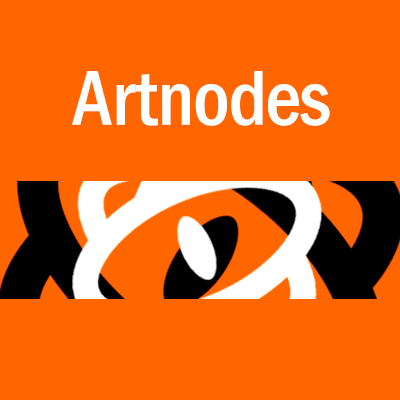
This journal published by the Faculty of Arts and Humanities analyses the intersections between art, science and technology.
This year, the journal has published two special collections. Issue 23 is a multifaceted proposal with a common thread: the impact of technology on our view of the past. The articles explore the fields of media archaeology and digital humanities from a range of perspectives. For example, you can learn more about the motivations of the Nefertiti Hack or take a look at the history of the Magic Lantern.
By contrast, issue 24 features a special section edited by Jorge Luis Marzo from the BAU University Design Centre in Barcelona devoted to post-truth. It includes the conclusions of the Second International Interface Politics Conference and addresses experiences, analyses and debates about the evolution of truth systems.
New year, new issue! The journal will see in 2020 with a section of articles on cultural and artistic practices in relation to fundamental physics and universe sciences. As always, you will find the regular miscellaneous section.
There is a call for papers that will remain open until 20 March for articles that explore the links between art, design, artificial intelligence and machine learning.

Specializing in information science, this journal is co-published by the University of Barcelona's Faculty of Library and Information Science and the UOC's Faculty of Information and Communication Sciences.
In issue 42, the journal has published a dossier entitled "Recomanació lectora: què, on i com prescriure obres i lectures" (Recommended reading: what, where and how to prescribe works and readings), coordinated by Lluís Quintana (UAB) and Lluís Agustí (UB). The articles address different aspects of the same thematic framework, such as e-reading clubs or the role professors play in recommending readings.
In the words of Àlex López Borrull, member of the journal's executive editorial board, for BiD, 2019 has served to "consolidate the early and staggered publication of the content".
This publication model means that you already have access to the first articles of issue 43, which will be published in full throughout December. In this issue you will find a dossier entitled "El futur és avui: biblioteques al servei d'una societat canviant" (The future is today: libraries at the service of a changing society), coordinated by Maite Comalat (UB) and Ciro Llueca (UOC).
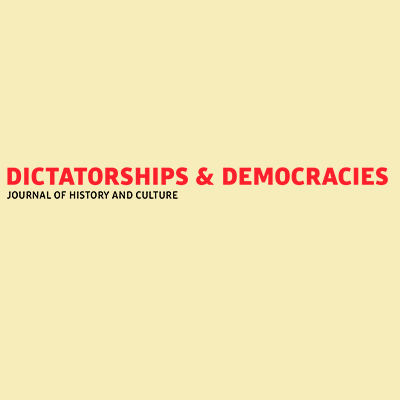
The Faculty of Arts and Humanities co-publishes this journal annually with the Fundació Carles Pi i Sunyer. It focuses on research into social and intellectual movements and contemporary democratization processes.
The journal's latest issue will be published soon and brings together the main conclusions of the international discussion "From Munich to Paris (1938-1940). From the Spanish Civil War to the German New Europe", which the journal's team published in collaboration with the Exile Memorial Museum and the Fundació Carles Pi i Sunyer.
The articles in issue 6 showcase how the journal has expanded its focus in recent years to adopt a more interdisciplinary and global perspective. You’ll find, for example, an article on theatre censorship in Spain during the Franco regime, an analysis of protest songs and revolutionary poetry in the Sandinista revolution.
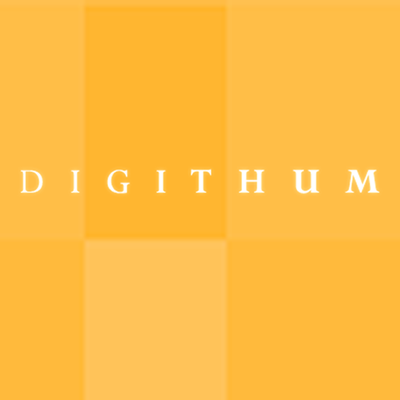
This journal is promoted by the Faculty of Arts and Humanities and is jointly published with the University of Antioquia in Colombia. The journal analyses culture from a relational perspective, inspired by Georg Simmel, Norbert Elias and Pierre Bourdieu.
It will see in the new year with issue 25, a special dossier exploring the relationship between the materiality of the body and studies on our senses and emotions.
For a taster, you can take a look at the articles in issue 24, containing two special dossiers. The first, coordinated by Olli Pyyhtinen from Tampere University, addresses how to use fiction as a theoretical resource in social scientific thinking. The second, coordinated by Hernán Borisonik from the National Scientific and Technical Research Council, looks into the theoretical aspects, uses and practices of money in the 21st century. It looks in more depth at questions such as the concept of the moral economy or analysis of Karl Ove Knausgård's My Struggle as a case of parrhesia.

The International Journal of Educational Technology in Higher Education (ETHE) is a journal on education and technology in higher education, co-published by four international universities: the UOC, the University of Los Andes, Dublin City University and Vytautas Magnus University in Kaunas.
The first few months of 2020 will see the publication of new articles from the latest dossier, which explores the potential of artificial intelligence in education. The dossier has been coordinated by experts such as Tony Bates (Ryerson University), Cristóbal Cobo, (Center for Research Ceibal Foundation), Olga Mariño (University of Los Andes) and Steve Wheeler (Plymouth Institute of Education).
For the time being, you can read the first two articles: an analysis of educational data to predict academic performance and a review of the research into the application of artificial intelligence in higher education.
This year also saw the publication of two dossiers:
“Technology Enhanced Learning or Learning Driven by Technology?” and “Food, Nutrition and the Online: Opportunities and Challenges for Higher Education and Lifelong learning”. The latter was coordinated by two experts in Health Sciences from the UOC, F. Xavier Medina and Alicia Aguilar.
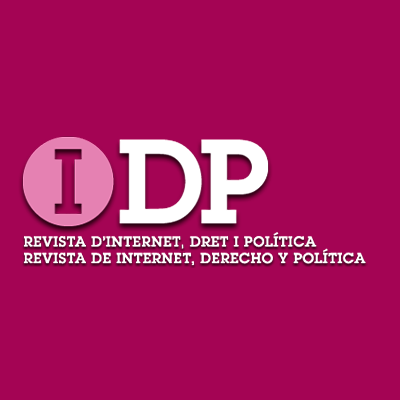
This journal's aim is to disseminate research and analyse the challenges and issues posed by information and communication technologies with regard to law and political science. It is publishes by the Faculty of Law and Political Science.
Issue 29 features articles that look in depth at various matter of law, such as online conflict resolution, the application of blockchain technology, and smart contracts for taxation and copyright infringements on the internet.
It also recently published some of the articles from issue 30, included among which you will find a review of the possibilities afforded by cryptoeconomics for tax purposes, an analysis of the national and international regulations that set out the rules of the game in cyberspace, and a study to clarify some of the main aspects of the new reform of package tours.
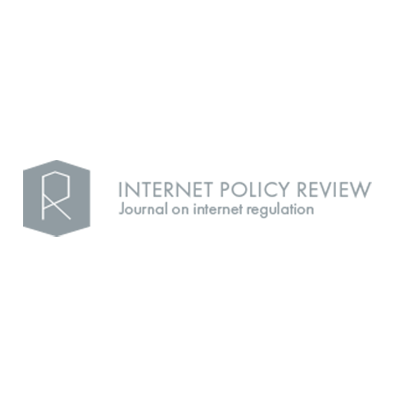
This journal was created by the Humboldt Institute for Internet and Society (HIIG) to provide an impetus to interdisciplinary research into internet regulation. The Internet Interdisciplinary Institute (IN3) co-publishes the journal.
Volume 8 includes a special issue: "Defining concepts of the digital society", with articles that offer a critical and interdisciplinary analysis of such concepts as algorithm governance, datafication, platformization and privacy. More articles will be added throughout 2020.
General interest journals

"Endavant, passeu, no us quedeu fora, come in!". This journal is published by the Faculty of Information and Communication Sciences and is an institutional, collective and specific tool in the field of knowledge.
This year, COMeIN has changed its editing and production circuit without interrupting its intense publication pace: two new articles a week, often very closely related to highly relevant topics.
As its director Ferran Lalueza explained, "the challenge undertaken is like changing your tyres with the car running, but we've come out on top thanks to the extremely high level of involvement of everyone who makes the journal possible".
Thanks to this publication frequency, you can now read the first articles of issue 24, where UOC experts present a highly diverse range of topics: Candela Ollé writes about the feature-length documentary L'escriptor d'un país sense llibreries (The Writer from a Country Without Bookstores), directed by journalist Marc Serena; Dani Aranda looks at parents' fears of video games; Sandra Sanz Martos summarizes the principal conclusions drawn following the hackathon known as Almanzora Comparte; and Mireia Montaña Blasco explains the conclusions of a study into the relationship between obesity and media consumption.
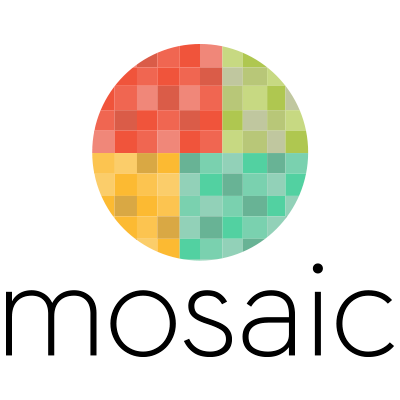
This journal belongs to the Faculty of Computer Science, Multimedia and Telecommunications. It discusses multimedia in a way that seeks to reinforce the relationship between academia and the business environment in this sector. It is also a showcase for the projects produced by students.
The journal's director, Irma Vilà Òdena, offered a review of the articles published over the year. She highlighted interviews with leading researchers such as Martí Sánchez-Fibla, who studies collaborative learning between agents/robots, and BeAnotherLab, an artistic group that develops systems and applications with the aim of achieving a more empathetic, altruistic and charitable society.
She also recommended articles such as the one by Xavi Manzanares on research into sonic interaction design (SID), multisensorial and sound experiences, and the one by Efraín Foglia on the Mobilitylab critical research and digital interaction platform. Finally, she suggested interviews with the likes of Ana Jiménez (Mercrominah), a video game artist and humorous cartoon illustrator.
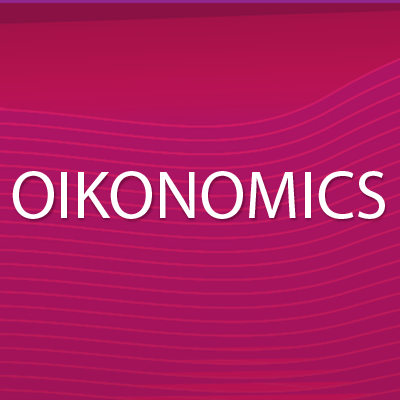
One of the most recently created journals, it is published by the Faculty of Economics and Business and analyses how the economy, business and society intersect.
"In 2019, we have focused on analysing the effects of digitalization on companies, organizations and society in general, with two specific dossiers", explained the director of Oikonomics, Joan Miquel Gomis.
The first one addresses how digital marketing is revolutionizing consumption and society, while the other takes a technological and ethical look at the future of finances within the framework of globalization.
The second was published in November and look at the contrasting progress and precariousness we're currently seeing. It was coordinated by a member of the Faculty, Josep Lladós, and took stock of the industrial revolution 4.0, the rise of robots in the labour market, artificial intelligence and the new professional profiles that this new technological framework brings with it.


